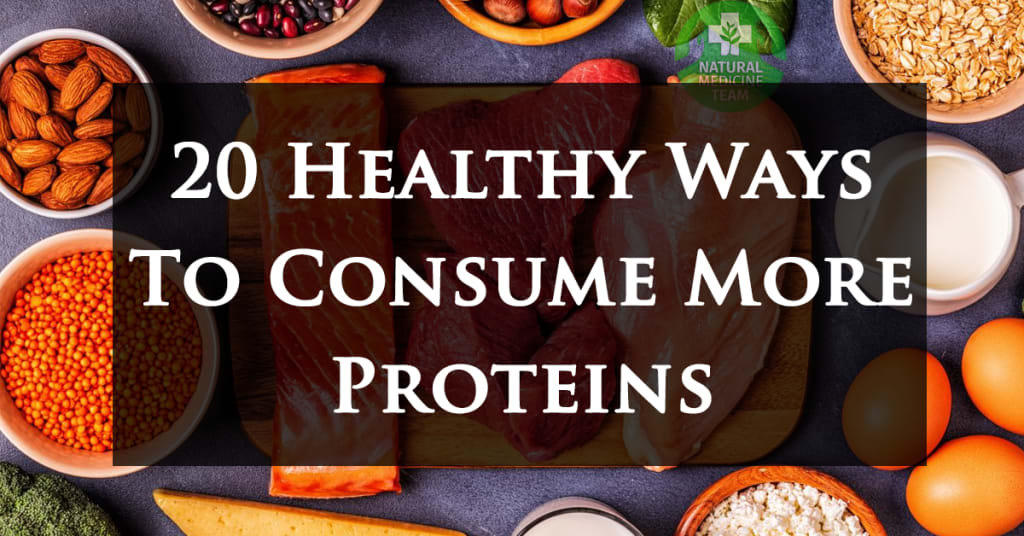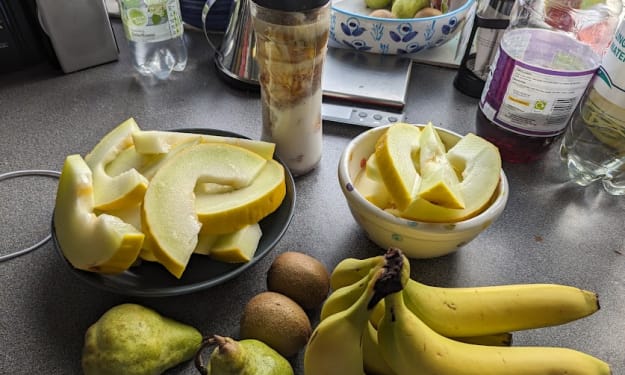20 Healthy Ways To Consume More Proteins
Healthy Ways To Consume More Proteins

Protein is one of the three essential macronutrients, which means we must get it through our diet.
Our body is a "machine" for the production of proteins with various functions. Just as a good example we will take enzymes. They are biological catalysts and an integral part of all metabolic reactions and pathways. Other examples are protein hormones, transporters, antibodies, etc.
However, the body also needs food proteins, especially some types of proteins, ie proteins that contain essential amino acids. The main functions of the proteins that are imported from food are building role (muscles, but also all other cells) and energy role (when necessary).
After proper digestion, the body has all the necessary amino acids at its disposal, so it can synthesize proteins with various functions. Also, adequate-protein intake suppresses ghrelin (hunger hormone), ie promotes a feeling of satiety, which strongly contributes to the weight loss process.
If you eat meat sparingly or not at all, it does not mean that you do not get enough protein!
Nowadays, proteins as nutrients are gaining more and more popularity, while fats and carbohydrates, on the other hand, are losing more and more. This can be easily seen through the trends that occur through the various diets.
This approach is incorrect. Each nutrient has its inseparable role for our body, so all should be taken in optimal proportion.
Relevant health institutions recommend, on average, consuming about 50g of protein in a diet that is "worth" 2000 calories (0.8g per kilogram of body weight). Of course, these values are individual, but the following macronutrient ratio is considered ideal: 10-20 % protein - 45-60% carbohydrates - 20-35% fat.
It is clear that meat is a rich source of protein, but if you want to get enough protein, it does not necessarily mean that you should eat more meat.
Meat and meat products indeed contain a high concentration of protein, which is composed of all essential amino acids but also contains some other substances that can be quite problematic for our body, such as certain toxins, especially if the meat is prepared by frying or grilling, a huge percentage of fat (saturated and trans fat), which means a lot of calories, etc. The World Health Organization classifies processed meat products as first-class carcinogens, along with cigarettes!
A plant-based diet can provide you with enough protein!
Let us first define what lies behind the term "quality protein".
We have already encountered the term essential amino acids. Amino acids are the building blocks of protein molecules, ie all proteins are made up of them. Proteins important for the human body are composed of 20 such amino acids, of which 9 are essential. This means that our body can not synthesize or produce them, so they should be regularly consumed through our diet.
Meat and its products are more concentrated sources of essential amino acids, but we have seen that they are also a source of other harmful components. On the other hand, plant foods, which are a good source of protein, have lower concentrations of such amino acids and rarely all of them are found in one food, although there are such examples, for example, quinoa seeds.
However, each of the 9 amino acids has a plant source, so all we need to do to get enough protein if we do not eat meat is to have a varied plant diet.
So, problems with protein deficiency in plant nutrition can occur if individuals do not have a proper and balanced diet or are too active, so their protein requirements grow too much (of course, there is a solution to this, and that is increased food intake).
Also, it is important to note that along with plant protein intake, we will include other very important, beneficial components, such as healthy fats, complex carbohydrates, fiber, minerals, vitamins, antioxidants, etc.
A varied diet is the key!
Having all the above in mind, it is clear that we need to have a varied diet, to know which plant foods contain enough quality protein, and if we eat animal foods, to do it less often and prepare it in an appropriate way (digestion, stew, etc.).
Therefore, we will list more plant products rich in proteins and essential amino acids. Regular consumption of combinations of all the products below will provide your body with sufficient amounts of protein.
Additionally, you should keep in mind that almost every food contains a certain percentage of protein, even fruits and vegetables.
20 ways to get plenty of protein without eating meat!
Seitan
It is obtained from wheat, ie from gluten. Contains 25g of protein per 100g of mass, which is probably the highest in the plant world. Also, it contains selenium, calcium, iron, phosphorus. Not suitable for people with celiac disease.
Tofu, tempeh, edamame
They are obtained from soy, which is a complete source of protein, ie its proteins contain all 9 essential amino acids.
The mentioned products contain 10-19g of protein in 100g, together with iron, calcium, vitamin K, fiber, and the tempeh also contains probiotics, vitamin B, magnesium, etc.
Lens
One cup of cooked lentils contains about 20g of protein, along with complex carbohydrates (low glycemic index) and 50% of the daily requirement for fiber. Buckwheat fiber is of high quality and serves as particularly good food for the beneficial intestinal microflora, promoting better digestive health, but also a reduced risk of heart disease, diabetes, weight gain, and some types of cancer.
Buckwheat also contains iron, folic acid, manganese, and antioxidants.
Chickpeas and beans
An excellent source of protein ( over 16g per cup cooked ), accompanied by other very important nutrients such as iron, complex carbohydrates, folic acid, potassium, phosphorus, and many other phytochemicals and antioxidant components.
Nutritional yeast
Deactivated Saccharomyces cerevisiae yeast sold as a yellowish powder or as small pieces. It can give a creamy texture and taste to dishes and is often added to tofu, popcorn, etc. Contains 14g of protein in 28g which are accompanied by 7g of fiber and excellent amounts of a range of B vitamins, including B12.
Peas
9g protein in a cup of boiled peas (250ml). It is more than protein in a glass of milk, for example. Also, these legumes are rich in fiber, vitamins K, C, A, B vitamins, folic acid, manganese, zinc, phosphorus, etc.
Spirulina
This blue-green algae is a super-food. In addition to many important nutrients (powerful antioxidants, essential fatty acids, magnesium, riboflavin, manganese, potassium, iron, copper, etc.) contains 8g of complete protein.
Quinoa seeds
As already mentioned, quinoa seed is one of the few plant sources of complete protein, with all 9 essential amino acids. One cup of cooked quinoa contains about 9g of protein.
Wholemeal Bread
People sometimes underestimate the protein in bread. Wholemeal bread, in addition to the excellent content of fiber, vitamins and minerals, also contains about 14g of protein per 100g. In one slice of bread, there is about 3g of protein.
Oats
One cup of cooked oats contains 12g of protein and 8g of fiber, along with magnesium, zinc, folic acid, complex carbohydrates, etc. Oatmeal is an ideal nutritious breakfast.
Brown rice
A meal of brown rice contains about 7g of protein, along with a significant amount of fiber, magnesium, manganese, copper, phosphorus, B vitamins, etc.
Nuts
Most nuts are a rich source of healthy fats and protein. For example, 10g of almonds contain almost 4g of protein.
Also, they contain fiber, iron, calcium, selenium, magnesium, vitamin, B vitamins, but also various other phytonutrients and antioxidant components.
Mushrooms
Especially nutritious concentrated food, which contains solid amounts of protein - 7g per cup of prepared mushrooms. Also, they have a texture that is most reminiscent of meat and have very few calories (a large amount of water).
Chia seeds
A super-food that, in addition to being a rich source of fiber and omega 3 fatty acids (nutrients that are often deficient in the population), also contains 2g of protein in 1 tablespoon.
Peanut butter
Energy and nutrition bomb! In just 2 tablespoons of peanut butter, in addition to healthy fats, you will add 10g of protein!
Soy milk
Greek low-fat yogurt
Even 22g in a glass!
Different types of cheese
Most cheeses have about 30% protein and some more. However, they are also a particularly rich source of saturated fatty acids, so special attention should be paid to the quantities.
Pumpkin
Pumpkin seeds contain over 30% protein! Pumpkin seeds are among the healthiest snacks you can find in the market.
Fresh food
You may be surprised, but fruits and vegetables also contain a certain amount of protein. Rich sources of protein are broccoli, spinach, asparagus, potatoes, sweet potatoes, etc.
They contain some rare essential amino acids and 4-5g of protein per serving. Fruits generally have less protein than vegetables, but some have a solid percentage of protein, such as bananas, nectarines and berries (2-4g per cup).
About the Creator
Top Natural Remedy
Natural Remedies, Health Tips, Recipes and more... topnaturalremedy.com >> Nature Is Your Best Medicine ☘️






Comments
There are no comments for this story
Be the first to respond and start the conversation.